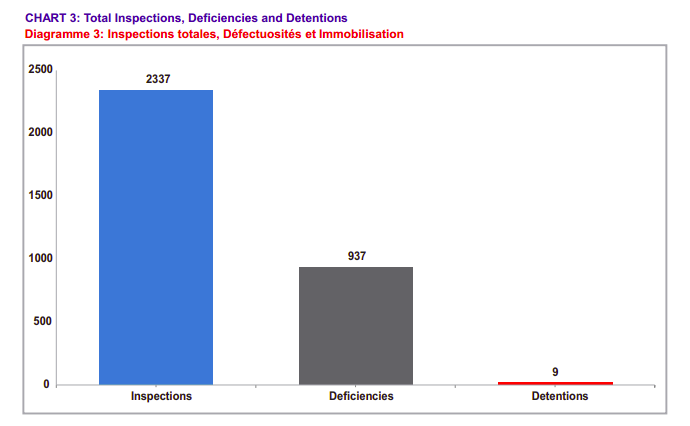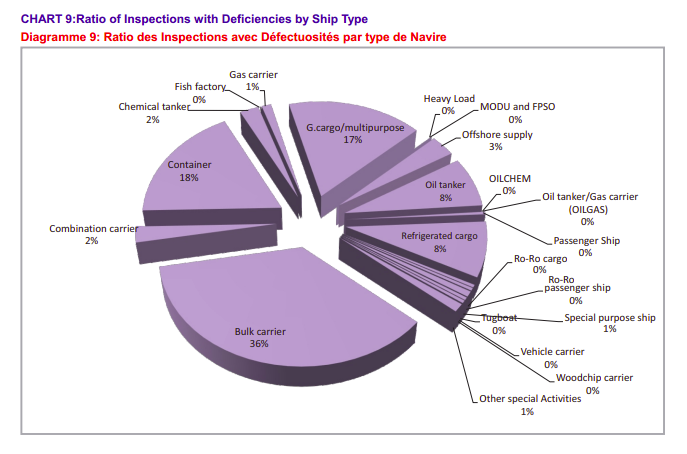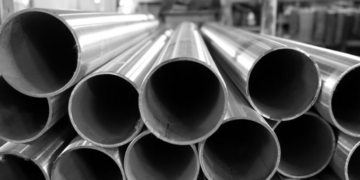Abuja MoU issued its annual PSC report, recording a total of 2,337 inspections, 937 deficiencies and nine detentions in 2020. SOLAS-related deficiencies still ranked the highest with 55.7% of all deficiencies recorded.
A total of 52,182 vessels visited the region in 2020, up from 50,328 in 2019. The increase in the number of vessels calling at the region did not directly translate to increase in the inspection rate due to the direct impact of COVID-19 on physical visitation as noted by all the regions and maritime nations.
 Ship inspections
Ship inspections
In summary, a total of 2,337 inspections were carried out on 2,164 individual ships. Nine (9) of these vessels were detained for deficiencies during the year, resulting in a 57% decrease in the number of detentions below 2019 figures of 21 detentions. The detention percentage per inspection of 0.39% in 2020 gives a 50% decrease below the 0.78% recorded in 2019. The spread of one deficiency for every 3.8 inspections in 2019 decreased to 2.5 inspections per deficiency in 2020. The region recorded a 13.3% decrease in inspection from 2,695 in 2019.
22 ship types were inspected in the year under review. The highest number of ship inspections relating to ship type were conducted on Bulk Carriers 925 (39.6%), followed by Container ships 399 (17.1%), Oil Tankers 278 (11.9%), General Cargo/multipurpose vessels 256 (11.0%), Refrigerated cargo vessels 140 (6.0%), Combination carrier 85 (3.6%), and Chemical Tankers 65 (2.8%) concludes the top seven most inspected ship types.
Ship deficiencies
A total of 937 deficiencies were recorded which is higher than the 2019 figure of 719. Correspondingly, the total number of 252 inspections with deficiencies is higher than the 222 figures of 2019. The percentage of inspections with deficiencies of 10.8 in 2020 is 31.1% increased above the 2019 figures of 8.24.
With respect to the categories of deficiencies, the most deficiencies were recorded on:
- Ship’s certificates and documents 121 (12.91%);
- Living and Working conditions 109 (11.63%);
- Propulsion and Auxiliary Machinery 99 (10.57%);
- Safety of Navigation 96 (10.25%);
- Fire safety 84 (8.96%);
- Structural conditions 65 (6.94%);
- Life-saving appliances 50 (5.34%);
- Emergency Systems 41 (4.38%).
- ISM 46 (4.91%)
It is noteworthy that one deficiency out of every 8 deficiencies recorded was related to Ship’s certificates and documents, which is 12.91% of all deficiencies recorded. It is also the topmost defective item recorded under SOLAS closely followed by Living and Working conditions, Propulsion and Auxiliary Machinery, Safety of Navigation and Fire safety.
The most notable deficiencies were related to:
- Ship’s certificates and documents 12.91%;
- SOLAS Convention 55.7%;
- MARPOL Convention 8.1%;
- STCW Convention 2.6%;
- Load Line Convention 3.2%;
- ILO (MLC, 2006) 13.2%.
Against the backdrop of the relevant instruments for the Abuja MoU PSC regime, SOLAS-related deficiencies still ranks the highest with 55.7% of all deficiencies recorded.

Ship detentions
The number of detentions decreased to nine (9) from the 2019 figures of 21. The detentions recorded were: 33.3% for Bulk Carrier; 22.2% for Offshore Supply; 22.2% for Container ship; 11.1% each for Refrigerated cargo ship and Tugboat.



































































